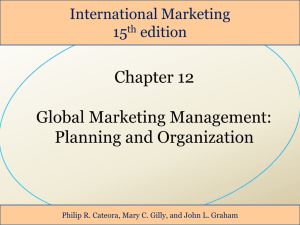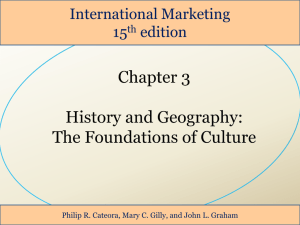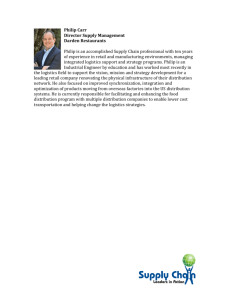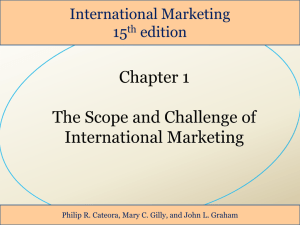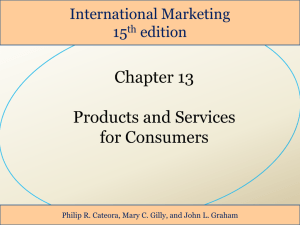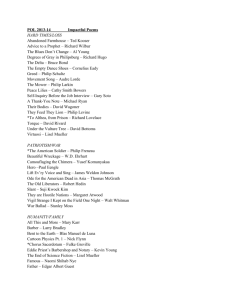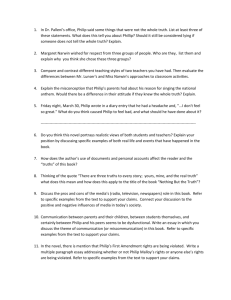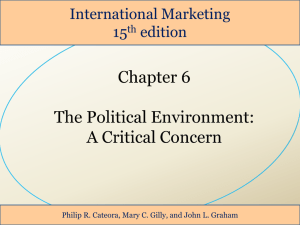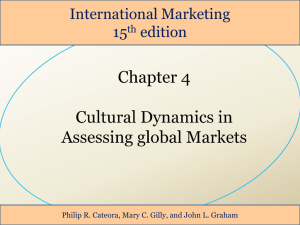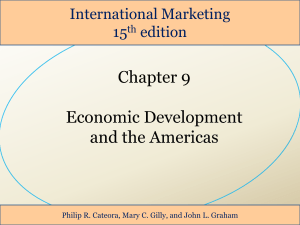Chapter 07 PowerPoint Presentation
advertisement
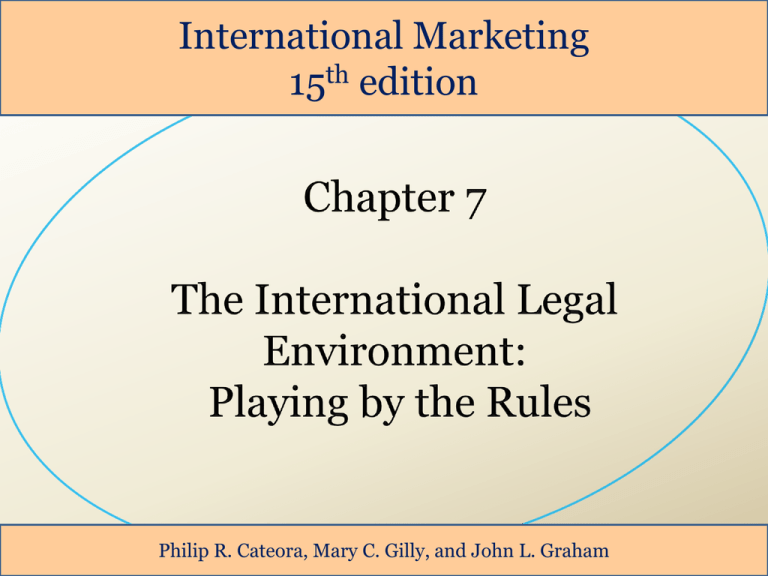
International Marketing 15th edition Philip R. Cateora, Mary C. Gilly, and John L. Graham Overview • Bases for today’s legal systems • The important factors in jurisdiction of legal disputes • The various methods of dispute resolution • The unique problems of protecting intellectual property rights internationally • Cyberlaw • Commercial law within countries • U.S. Laws application in host countries • Export restrictions Roy Philip 2 Bases for Legal Systems • Four heritages form the basis for the majority of the legal systems of the world – – – – Common law Civil or code law Islamic law Marxist-socialist tenets • Even though a country’s laws may be based on the doctrine of one of the four legal systems its individual interpretation may vary significantly Roy Philip 3 Common and Code Law • Common law – Seeks interpretation through the past decisions of higher courts which interpret the same statues – Applies established and customary law principles to a similar set of facts – Are recognized as not being all-inclusive – Ownership is established by use • Code law – Legal system is generally divided into three separate codes • Commercial • Civil • Criminal – Ownership is determined by registration – Considered complete as a result of catchall provisions found in most code-law systems Roy Philip 4 Islamic Law • The basis for Islamic law is interpretation of the Koran • Islamic law defines a complete system that prescribes specific patterns of social and economic behavior for all individuals – Property rights – Economic decision making – Types of economic freedom • Among the unique aspects of Islamic law is the prohibition against the payment of interest • The Islamic system – Places emphasis on the ethical, moral, social, and religious dimensions to enhance equality and fairness for the good of society Roy Philip 5 Jurisdiction in International Legal Disputes • No judicial body exists to deal with legal commercial problems arising between citizens of different countries – Legal disputes can arise in three situations • Between governments • Between a company and a government • Between two companies • Jurisdiction is generally determined on the basis of: – Jurisdictional clauses included in contracts – Where a contract was entered into – Where the provisions of the contract were performed • Most clear-cut decisions can be made: – When contracts or legal documents supporting a business transaction include a jurisdictional clause Roy Philip 6 Litigation • The best advice is to seek settlement • Deterrents to litigation – Fear of creating a poor image and damaging public relations – Fear of unfair treatment in a foreign court – Difficulty in collecting a judgment that may otherwise have been collected in a mutually agreed settlement through arbitration – The relatively high cost and time required when bringing legal action – Loss of confidentiality Roy Philip 7 Protection of Intellectual Property Rights – A Special Problem • http://www.wipo.int/about-ip/en/ - What is intellectual property? • Companies spend millions of dollars establishing brand names or trademarks to symbolize quality and design and to entice customers • Millions are spent on research to develop products, processes, designs, and formulas • Intellectual or industrial properties are among the most valuable assets • New technologies developed to prevent piracy Roy Philip 8 Counterfeiting and Piracy • Lost sales from the unauthorized use of U.S. patents, trademarks, and copyrights – Amount to more than $100 billion annually • The piracy industry has grown so sophisticated – Many counterfeit goods are indistinguishable from original • Piracy actually can serve come companies – Microsoft • Counterfeit pharmaceuticals – 2% of the $327 billion worth of drugs sold each year – http://hwrms.com/blog/?p=453 – fun pirated products – http://torrentfreak.com/top-10-most-pirated-movies-onbittorrent-100629/ Roy Philip 9 Inadequate Protection • Failing to adequately protect intellectual property rights can lead to the legal loss of rights in potentially profitable markets • There have been many cases where companies have legally lost the rights to trademarks and have had to buy back these rights or pay royalties for their use – McDonald’s in Japan • Many businesses fail to take proper steps to legally protect their intellectual property Roy Philip 10 Prior Use Versus Registration • Prior Use – whoever can establish first use is typically considered the rightful owner • Registration – the first to register a trademark or other property right is considered the rightful owner • A company that believes it can always establish ownership in another country by proving it used the trademark or brand name first is wrong and risks the loss of these assets • It is best to protect intellectual property rights through registration • http://www.audioholics.com/news/industry-news/dvdpiracy-china-black-market Roy Philip 11 International Conventions • Three major international conventions – Paris Convention for the Protection of Industrial Property – Inter-American Convention – Madrid Arrangement • World Intellectual Property Organization (WIPO) – Responsible for the promotion of the protection of intellectual property and for the administration of the various multilateral treaties through cooperation among its member states • Patent Cooperation Treaty (PCT) • European Patent Convention (EPC) • The Trade-Related Aspects of Intellectual Property Rights (TRIPs) Roy Philip 12 Marketing Laws (1 of 2) • All countries have laws regulating marketing activities – – – – – Promotion Product development Labeling Pricing Channels of distribution • Discrepancies across markets cause problems for trade negotiators – particularly for managers and their firms – U.S. does not allow the buying or selling of human organs – Some countries only have a few marketing laws with lax enforcement – Others have detailed, complicated rules that are stringently enforced Roy Philip 13 U.S. Laws Apply in Host Countries (1 of 2) • Foreign Corrupt Practices Act – Makes it illegal for companies to pay bribes to foreign officials, candidates, or political parties • National security laws – Prohibit a U.S. company, its subsidiaries, joint ventures, or licensees to sell controlled products without special permission from the U.S. • Antitrust laws – Enforcement has two purposes in international commerce • Protect American consumers • Protect American exports and investments against any private restrictions – The question of jurisdiction and how U.S. antitrust laws apply • Sections I and II of the Sherman Act Roy Philip 14 U.S. Laws Apply in Host Countries (2 of 2) • Antiboycott law – U.S. companies are forbidden to participate in any unauthorized foreign boycott – Required to report any request to cooperate with a boycott • Extraterritoriality of U.S. laws – Especially important to U.S. multinational firms – Foreign governments fear the influence of American government policy on their economies through U.S. multinationals • When U.S. laws conflict with those of host country • When U.S. Justice Department restricts of forbids ventures because of anticompetitive effects Roy Philip 15
